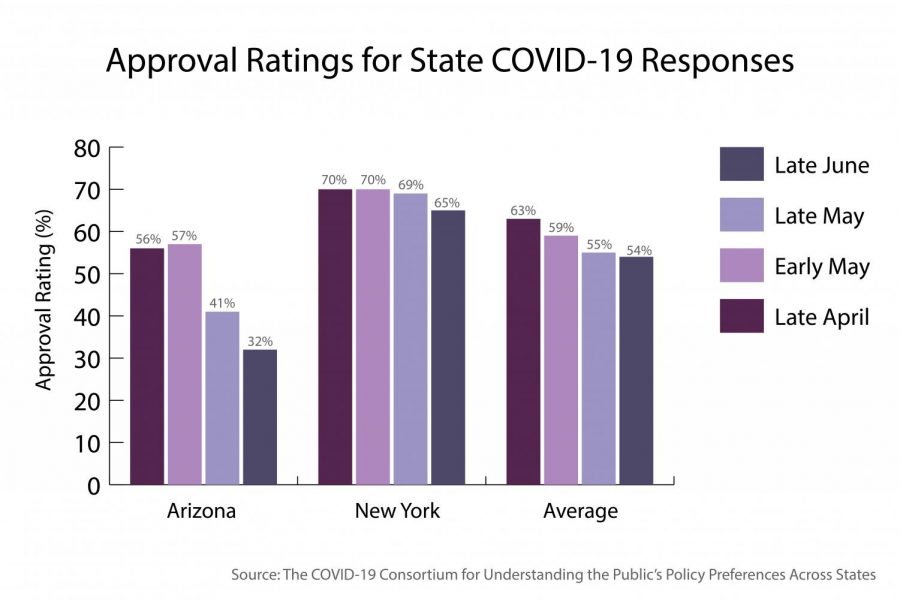Polling results spell trouble for Trump, governor reelection campaigns
Data from the consortium’s report shows declining support for state COVID-19 responses. Arizona, which recently experienced a spike in COVID-19 cases, has the lowest gubernatorial approval of any state, while New York, an early hotspot whose numbers are now declining, has one of the highest.
July 20, 2020
A joint research project by a consortium of universities, including Northwestern, has found that approval ratings for state and federal government COVID-19 responses have declined across the country.
Political science Prof. James Druckman collaborated with researchers from four other universities as part of the COVID-19 Consortium for Understanding the Public’s Policy Preferences Across States. The group conducted five surveys between April and June 2020 assessing public opinion and found approval for state governors’ and President Donald Trump’s COVID-19 responses respectively declined by 10 and 8 percentage points on average in each state.
There were only five states where approval improved between April and June. Druckman, who also serves as the associate director of the Institute for Policy Research, said he hadn’t anticipated the widespread-nature decreased support.
“The decline in some of the gubernatorial approval in some of the Republican states was surprising because for a lot of the time through the pandemic, partisanship has seemed pretty sticky,” he said. “But it seems in this case, people were looking more at the conditions on the ground, rather than partisanship.”
According to the study, approval for Republican governors is “particularly polarized,” with four Republican governors all in Democratic-leaning states with approval ratings at or above 70 percent compared to ten governors — eight of whom represent Republican-leaning states — with approval ratings below 45 percent.
Arizona presented a unique situation to the researchers as the state with the lowest gubernatorial rating in the country, possibly due to Republican Gov. Doug Ducey’s rapid reopening despite public opposition.
Phoenix resident and Weinberg sophomore Jay Patel wasn’t surprised by this.
“(Cases) have started to spike and my disapproval of him has skyrocketed,” Patel said. “I’m not shocked that he has a bad approval rating, just because of his general disregard for community safety, his general disregard for his COVID response and his turning his back to Arizona.”
In New York, however, support for Gov. Andrew Cuomo has remained high, hovering at or around 70 percent. Communication junior Valerie Fong said the decline in case numbers despite the state’s reopening made her feel “confident and very proud” in Cuomo.
Fong, who is now back at home in Queens, is still worried about how rising case numbers in other states might affect New York.
“It makes it a lot easier for us emotionally to know we do have a governor we can trust and who is equally worried as the rest of us about a second wave and the consequences of this pandemic,” she said. “It’s important to still be on high alert nonetheless and to follow the news elsewhere because New York state isn’t it’s own entity. We are affected by what’s going on around us.”
The result of the study bode poorly for President Trump’s reelection prospects in November. Their polling shows the percentage of voters who prefer former Vice President Joe Biden increased from 5 percent to 10 percent between April and June.
The racial disparities of the pandemic are also echoed in approval ratings — only 14 percent of black Americans and 24 percent of Latino Americans approved of the president’s COVID-19 response, compared to 42 percent of white Americans. Women, Americans ages 18 to 24 and those with a household income of less than $25,000 were also less likely to approve of his handling of the pandemic.
“(Trump is) certainly in a difficult position, given that he anticipated really banking on the economy being strong,” Druckman said. “I think the most telling thing about his electoral challenges (is that) the approval on COVID is so incredibly low — 31 percent … Unless he’s able to move COVID off the central issue on the agenda, I think he’s going to have a very difficult time winning reelection.”
Email: [email protected]
Twitter: @meganmuncie
Related Stories:
— Northwestern researchers find a dramatic increase in food insecurity during COVID-19 pandemic
— Research finds racial discrimination in mortgage market persistent over last four decades


